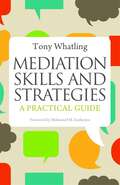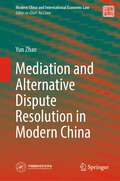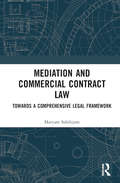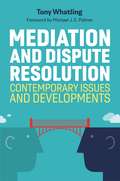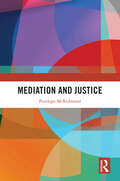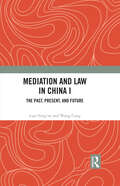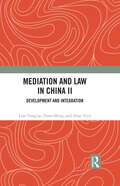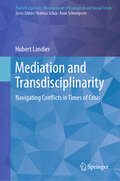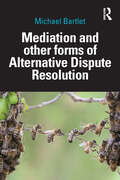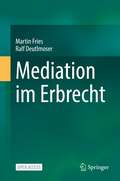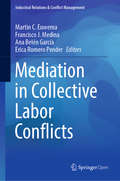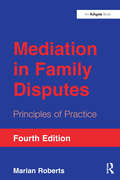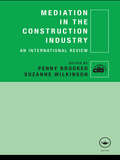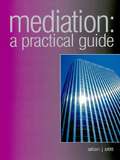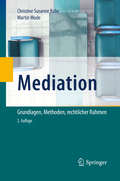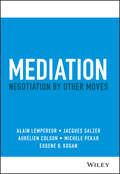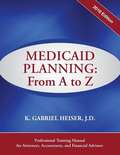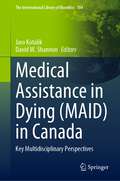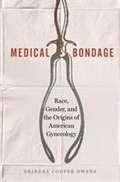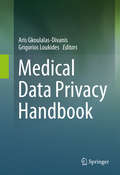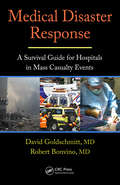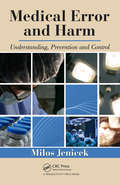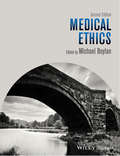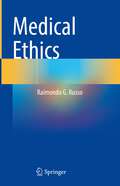- Table View
- List View
Mediation Skills and Strategies: A Practical Guide
by Tony WhatlingMediation is a process that can be used to resolve conflict in many different dispute contexts. This book focuses on the essential skills and strategies needed by any mediator to be successful in their work. Tony Whatling draws on his extensive experience in the field of mediation to explain the range of skills and strategies that are commonly used, as well as why you would use different skills and when they are best employed. The author shows how, by adopting these techniques, a mediator can manage challenging conflicts. It features the use of questioning skills and how they can be used effectively, as well as how to deal with high emotion and negative responses. This book is essential for anyone who wants to improve their mediation skills, whether as a trainee, novice or experienced professional.
Mediation and Alternative Dispute Resolution in Modern China (Modern China and International Economic Law)
by Yun ZhaoThe book examines the development and application of mediation in China (including Hong Kong). As a popular mechanism for dispute resolution in Chinese history, mediation is believed to be an important process for realizing the official goal of social harmony. Following an overview of the current situation in mainland China and Hong Kong, the book looks into specific legal issues in the application of mediation and the practical use of mediation in specific lines of businesses. The book can serve as an important reference book on the law and practice of mediation in mainland China and Hong Kong for scholars, practitioners, as well as students of mediation and alternative dispute resolution.
Mediation and Commercial Contract Law: Towards a Comprehensive Legal Framework
by Maryam SalehijamThere is an urgent need to better understand the legal issues pertaining to alternative dispute resolution (ADR), particularly in relation to mediation clauses. Despite the promotion of mediation by dispute resolution providers, policy makers, and judges, use of mediation remains low. In particular, problems arise when parties lack certainty regarding the legal effect of a mediation clause, and the potential uncertainty regarding the binding nature of agreements to pursue mediation is problematic and threatens the growth of ADR. This book closely examines the importance and complexity of mediation clauses in commercial contracts to remedy this persistent uncertainty. Using comparative law methods and detailed empirical research, it explores the creation of a comprehensive framework for the mediation clause. Providing valuable insight into the process of ADR and mediation, this book will be of interest to academics, law makers, law students, in-house council, lawyers, as well as parties interesting in drafting enforceable mediation clauses.
Mediation and Dispute Resolution: Contemporary Issues and Developments
by Tony WhatlingMediation and Dispute Resolution addresses contemporary challenges and new developments in mediation. It aims to provide you with the key tools needed as an ADR practitioner to develop your own style and practice.The book examines the impact of diversity and cultural difference in mediation, gender difference and its implications, and the process of managing high conflict. It also explores new areas of practice such as apology and reconciliation and conjoint mediation and therapy. With advice on how to manage the move into mediation from a previous professional career, the conflicts between practitioners' personal lives and their work are also discussed.Throughout, the book focusses on practical strategies and skills, using case examples in each chapter to highlight the application of theory. An invaluable resource for both experienced and novice mediators to build, consolidate and improve their practice, this book is a perfect complement to Whatling's introductory guide Mediation Skills and Strategies.
Mediation and Justice
by Penelope McRedmondThis book asks why justice is important to both individuals and to society as a whole. A number of justice questions are raised to evaluate whether mediation can deliver social, distributive, procedural, or substantive justice and fairness.Focussing on a scrutiny of mediation in the context of justice, the book covers social justice and justice issues posed by confidentiality, bias, lack of fairness, and Online Dispute Resolution. Discussing whether mediation can truly deliver justice to all, this book identifies areas where this fails and provides solutions and suggestions for improvement.. The dangers of private justice, bias, mandatory mediation, and the side lining of the importance of fairness in the resolution of disputes are all considered. In contrast, the positive aspects of mediation are added to the balance.This book will be of interest to researchers in the field of conflict resolution, law, and social science. Readers will also be found among mediators and people interested in justice and the civil justice system.
Mediation and Law in China I: The Past, Present, and Future
by Liao Yong’an Wang CongAs the first volume of a two-volume set on mediation in China, this book examines the legal foundations of Chinese mediation and feasible paths to the institutionalization and professionalization of mediation.Grounded in traditional dispute resolution practices throughout Chinese history, mediation is born out of the Chinese legal tradition and considered to be “Eastern” in nature. The first volume discusses the legal principles that underpin mediation in China, rooted in a legal tradition that pursues the rule of law and morality as well as the concept of harmony in Chinese society. It first revisits traditional notions and models of Chinese mediation and then puts forward approaches to innovating the concept, institutionalization, and mechanism of mediation. The book also discusses how to promote professionalization and special legislation dedicated to mediation in China, thus establishing a mediation system that fits into and is properly tailored for Chinese society. It introduces diverse styles of mediation and social governance in different cultural contexts and demonstrates the effectiveness of China's experience in dealing with a litigious society.This title will serve as a crucial reference for scholars, students and related professionals interested in alternative dispute resolution, civil litigation, and especially China’s dispute resolution policy, law, and practice.
Mediation and Law in China II: Development and Integration
by Liao Yong’an Duan Ming Zhao YiyuAs the second volume of a two-volume set on mediation in China, this book examines the development of a diversified dispute resolution regime and other major types of mediation in China.Grounded in traditional dispute resolution practices throughout Chinese history, mediation is born out of the Chinese legal tradition and considered to be “Eastern” in nature. This second volume focuses on eight types of mediation prevalent in China in terms of its formation, development, challenges and achievements: people's mediation, court mediation, administrative mediation, industry mediation, commercial mediation, lawyer mediation, online mediation, and a combination of arbitration and mediation. In analyzing these diversified forms of mediation, the authors explain the necessity of integrating emerging forms of mediation with historical ties and traditional practice and thereby reshape a mediation system that incorporates diversified approaches, changing contexts and various dimensions including history and reality, theory and practice, state and society.This title will serve as a crucial reference for scholars, students and related professionals interested in alternative dispute resolution, civil litigation, and especially China’s dispute resolution policy, law, and practice.
Mediation and Transdisciplinarity: Navigating Conflicts in Times of Crisis (Transdisciplinary Management of Ecological and Social Crises)
by Hubert LandierThe world is in crisis at every level: the planet, humanity, and all kinds of human communities, including working communities. The result is likely to be violence and chaos. And yet, man lives and can only live with others. Relationships in all their forms therefore need to be developed with a view to building a common future. However, when this in-between has been broken, when it is no longer possible to get along, when violence threatens or develops in a sometimes dramatic way, it may be necessary for both sides to call on an external third party. This book is based on decades of professional experience in the practice of corporate mediation. It examines the crucial role of mediators in resolving conflicts and fostering understanding in various contexts. By exploring real-life case studies and theoretical frameworks, the book offers valuable insights into how mediation can be a powerful tool for creating a harmonious and sustainable future.
Mediation and other forms of Alternative Dispute Resolution
by Michael BartletCovering both the principles and practice of Alternative Dispute Resolution (ADR), this important new textbook equips students not only with a contextual understanding of the role of ADR in adjudicating civil disputes but also with the different forms of mediation and ADR available and the key issues in their application.Providing theoretical and practical insights, the book begins with a critical examination of the tenets on which ADR is based, where it sits in relation to civil law, and how it is applied in different national contexts. It discusses the various areas in which mediation or arbitration can be applied, from family mediation to restorative justice, and includes chapters on the ethics of mediation and its psychology, as well as an introduction to online dispute resolution (ODR). The concluding chapter offers some thoughts on the benefits and challenges of mediation.Featuring a glossary of key terms, detailed case law, end-of-chapter problem questions, and advice around listening skills during a mediation process, Mediation and other forms of Alternative Dispute Resolution is an essential textbook for any student approaching ADR for the first time and offers practitioners an opportunity to reflect on the context of ADR.
Mediation im Erbrecht
by Martin Fries Ralf DeutlmoserDieses Open-Access Buch erläutert in einer praxisnahen Darstellung, wie sich Erbstreitigkeiten durch eine Mediation zügig und für alle Beteiligten sehr befriedigend beilegen lassen. Auf der Grundlage ihrer jahrelangen Mediationspraxis berichten die Verfasser, warum sich erbrechtliche Konflikte in besonderer Weise für pragmatische Kompromisse eignen und wie es gelingt, die Erben auf diesen Weg zu bringen. Das Buch versteht sich als Ratgeber für anwaltliche Berater, Mediatoren sowie für Erblasser und Erben und gibt vielfältige Hilfestellungen für kluges Konfliktmanagement in der Gestaltung und Abwicklung der Vermögensnachfolge.
Mediation in Collective Labor Conflicts (Industrial Relations & Conflict Management)
by Ana Belén García Martin C. Euwema Francisco J. Medina Erica Romero PenderThis open access book opens up the black box of mediation in collective conflicts through the analyses and comparisons of various systems. Mediation and related third party interventions such as conciliation and facilitation are discussed as effective prevention and regulation tools for different types of collective labor conflicts. These interventions fit in a new developed five-phase model of collective conflicts in organizations, going from capacity building in latent conflicts, through conciliation, mediation and arbitration in escalating phases, to rebuilding of trust after hot conflicts. The authors promote understanding and discussion with regards to labor mediation systems, presenting comparative research on the perspectives of mediators and users of mediation. This book describes and analyses laws, regulations and practices of mediation in seventeen countries, with a relative strong emphasis on Europe. Part 1 presents theoretical frameworks on conciliation and mediation in collective labor conflicts. Part 2 presents regulations and practices in 12 European countries: Belgium, Denmark, Estonia, France, Italy, Poland, Portugal, Spain, The Netherlands, and the United Kingdom. Part 3 discusses mediation in these collective conflicts in Australia, China, India, South Africa and the USA. Part 4 offers conclusions and ways forward. This book offers analyses, good practices and developments for third party intervention in collective labor conflicts in global and local changing environments. This book is a must-read for policy makers, , social partners at different levels, as well as scholars and practitioners in industrial relations, human resources management and conflict management, particularly conciliators and mediators.
Mediation in Family Disputes: Principles of Practice
by Marian RobertsThis is the authoritative textbook on family mediation. As well as mediators, this work will be indispensable for practitioners and scholars across a wide range of fields, including social work and law. It draws on a wide cross-disciplinary theoretical literature and on the author's extensive and continuing practice experience. It encompasses developments in policy, research and practice in the UK and beyond. Roberts presents mediation as an aid to joint decision-making in the context of a range of family disputes, notably those involving children. Mediation is seen as a process of intervention distinct from legal, social work and therapeutic practice, drawing on a distinctive body of knowledge across disciplinary fields including anthropology, psychology and negotiation theory. Incorporating empirical evidence, the book emphasises the value of mediation in mitigating the harmful effects of family breakdown and conflict. First published in 1988 as a pioneering work, this fourth edition has been fully updated to incorporate legal and policy developments in the UK and in Europe, new sociological and philosophical perspectives on respect, justice and conflict, and international research and practice innovations.
Mediation in the Construction Industry: An International Review
by Penny BrookerThe application of construction dispute procedures has changed dramatically in the last decade. This has resulted in an increased use of Alternative Dispute Resolution in many countries, and mediation in particular. Construction is one of the major industries using mediation, in the UK and in many other countries such as the US, China, Australia and New Zealand. This expansion in mediation has been helped by encouragement from governments, although it takes diverse forms in different legal jurisdictions, for example: court rules to encourage this use (as in the US and UK); the courts’ own mediation schemes or programmes, or legislation-backed programmes; or the use of industry driven mediation clauses in standard form contracts. These developments have taken place extremely rapidly. They represent significant changes to the legal environment within which the international construction industry conducts its business but, to date, there has been little research on their impact. All these initiatives have inevitably led to a developing legal jurisprudence concerned with the validity of contract clauses or with providing statutory interpretation of the rules requiring or governing practice. This has important consequences for the construction industry because legal uncertainty increases the likelihood of dispute, which is not only costly for the disputants but can be damaging to national and global economies. This book identifies the emerging international practices within construction mediation, and seeks solutions to the many legal and commercial challenges which they pose. It presents an international collection of reviews by experts, and allows a comparative commentary on the practice of construction mediation and the legal challenges facing its development.
Mediation: A Practical Guide
by Alan StittThis unique and practical resource shows what mediation is, the rationale behind it and how it differs from litigation. It explains every aspect of the mediation process and provides practical tips and useful case studies, clearly setting out all the do's and don'ts of mediation.
Mediation: Grundlagen, Methoden, rechtlicher Rahmen
by Christine Susanne Rabe Martin WodeDas Buch vermittelt praxisbezogen die grundlegenden Prinzipien, Methoden und den Ablauf der erfolgreichen Mediation. Im Mittelpunkt stehen bewährte Kommunikations- und Gesprächstechniken, Beginn und Durchführung der Mediation, der Mediationsvertrag und die Abschlussvereinbarung sowie ein historischer Abriss. Übersichten veranschaulichen die Struktur des Gesprächs im Mediationsverfahren; zahlreiche Praxisbeispiele, Checklisten und Formulierungshilfen erleichtern die Umsetzung. Die klare und übersichtliche Darstellung ermöglicht das schnelle und gezielte Nachschlagen zentraler theoretischer und praktischer Aspekte der Mediation. Ein auf die Phasen der Mediation bezogenes Sachverzeichnis ermöglicht das Nachschlagen von Techniken und Checklisten, die zum jeweiligen Verfahrenszeitpunkt hilfreich sind. Das Buch richtet sich an Mediatoren in der Ausbildung ebenso wie an erfahrene Praktiker. Die 2. Auflage enthält die relevanten Ergänzungen des Mediationsgesetzes durch die ZMediatAusbV und Hinweise zur (Selbst-) Zertifizierung. Ein zusätzliches Kapitel widmet sich u.a. der Konfliktklärung in interkulturellen Kontexten und der Mediation bei Beteiligungsprozessen bei Veränderungen im Unternehmen. Auch die Herausforderungen des „internen Mediators“ sowie der Mediation in geschlossenen Systemen wie etwa auf (Kreuzfahrt-) Schiffen oder Justizvollzugsanstalten werden berücksichtigt. Das Buch endet mit einem Ausblick auf Mediation im Kontext der Digitalisierung
Mediation: Negotiation by Other Moves
by Alain Lempereur Aurelien Colson Michele Pekar Jacques Salzer Eugene B. KoganWhen negotiation fails, mediation avails other moves for an amicable resolution. Whether you are a current or future mediator or a party to a conflict, this is your essential companion to the theory, concepts, and best practices of mediation. In a world ridden by social divisions, responsible resolution of conflicts is more timely than ever. What happens when parties are unable to negotiate an agreement together? The next move is to invite a third party to reset the negotiations, facilitate the exchanges, rebuild a working relationship and empower the parties to explore the past, surface their present needs, invent, evaluate and choose the best solutions for the future. Mediation: Negotiation by Other Moves brings decades of critical analysis and experience that the authors tested worldwide in international organizations, governments, NGOs, universities and corporations. You will understand mediation better, and its significance in your personal and professional life. You will be able to develop a flexible mindset and a broad outlook to achieve sustainable outcomes. This book will cover: Models and principles from various domains of mediation: family, business & labor, public affairs, international relations A mediation framework to prepare for mediation and to run its process smoothly A step-by-step approach to a mediation session, from the opening until a possible settlement, via the various phases of problem solving Mediation traps and how to avoid them—for mediators and parties alike Ethics of mediation and questions of responsibility Mediation: Negotiation by Other Moves is essential reading for anyone who wishes to develop a pragmatic approach to mediation.
Medicaid Planning: From A to Z (2018 Ed. )
by K. Gabriel HeiserIf you wish to advise clients how to qualify for nursing home Medicaid while protecting their assets, this is the definitive book! Written by an elder law attorney with over 25 years of experience, this manual is the professional edition version of attorney Heiser's best-selling Medicaid Secrets book. This manual is geared toward attorneys, accountants, and financial advisors seeking up-to-date and accessible information on the Medicaid program rules as well as a complete analysis of available Medicaid asset protection techniques for their clients. Includes a summary of all income and asset rules for both married and single individuals, together with numerous examples and several case studies, which take the planner through the same thought processes that an experienced elder law attorney would go through when analyzing a real-life client's situation. The book includes tips on: how to title the home so the client does not lose it to the state; how to make transfers to family members that won't disqualify the client from Medicaid; how "Medicaid annuities" work to make assets "disappear" for Medicaid eligibility purposes; clever ideas for "spending down" assets; what to change in a client's will to save thousands of dollars if the spouse ever needs nursing home care; avoiding the state's reimbursement claim following the nursing home resident's death; and much more. The 2018 Edition has been expanded, revised, and completely updated to incorporate all changes in the law as of January 1, 2018, and includes two chapters on Veterans' benefits as well as a 39-page Ethics of Elder Law section. Completely annotated with all case citations and statutory references given in over 560 footnotes. Also includes full copies of relevant statutes and a sample filled-out Medicaid application, plus sample clauses for deeds, wills, powers of attorney, etc.
Medical Accident Liability and Redress in English and French Law
by Simon TaylorIn 2002 France introduced an out-of-court settlement scheme for medical accidents. The scheme guarantees compensation for the victims of the most serious medical accidents irrespective of fault and operates in parallel with existing liability rules. In this book Simon Taylor compares English and French law on medical accident liability and redress and considers what lessons the French model can provide for potential reform in England and elsewhere. Taylor emphasizes the effect of the English and French rules on access to compensation and on the cost of liability and examines the problems that have been posed by the introduction of an administrative redress scheme in France. This book looks at the potential consequences of English and French rules for the doctor-patient relationship and for patient safety, and considers the role that national legal traditions and cultures of civil liability in England and France play in shaping national law in this area.
Medical Assistance in Dying: Key Multidisciplinary Perspectives (The International Library of Bioethics #104)
by Jaro Kotalik David W. ShannonThis book, written both for a Canadian and an international readership, provides a multidisciplinary review of the framework and performance of the Canadian Medical Assistance in Dying (MAID) program. In the first five years (2015-2021) of operation, this program delivered voluntary euthanasia and assistance in suicide to over 30,000 Canadian residents, presently representing a 30% annual growth. Looking back on these first five years, the 30 Canadian scholars and clinicians contributing to this volume raise important issues and attempt to answer key questions that have arisen in regards to its operation and its stated objectives. This volume strikes the most appropriate balance between the autonomy of persons who seek medical assistance, versus the interests and protection of vulnerable persons. Finally, the book makes suggestions on how the program can presently be improved. It identifies gaps in knowledge about MAID’s operational program and its impact on individuals, families and society in order to stimulate the necessary research that is essential to the evolution of a healthy and well-balanced program. As a first, comprehensive examination of medically assisted deaths in Canada, this publication will be of great value to lay, professional, academic, political audiences both domestically and internationally, especially in jurisdictions that are examining their options of permitting assisted deaths.
Medical Bondage: Race, Gender, And The Origins Of American Gynecology
by Deirdre Cooper OwensThe accomplishments of pioneering doctors such as John Peter Mettauer, James Marion Sims, and Nathan Bozeman are well documented. It is also no secret that these nineteenth-century gynecologists performed experimental caesarean sections, ovariotomies, and obstetric fistula repairs primarily on poor and powerless women. Medical Bondage breaks new ground by exploring how and why physicians denied these women their full humanity yet valued them as ?medical superbodies? highly suited for medical experimentation. In Medical Bondage, Cooper Owens examines a wide range of scientific literature and less formal communications in which gynecologists created and disseminated medical fictions about their patients, such as their belief that black enslaved women could withstand pain better than white ?ladies.' Even as they were advancing medicine, these doctors were legitimizing, for decades to come, groundless theories related to whiteness and blackness, men and women, and the inferiority of other races or nationalities. Medical Bondage moves between southern plantations and northern urban centers to reveal how nineteenth-century American ideas about race, health, and status influenced doctor-patient relationships in sites of healing like slave cabins, medical colleges, and hospitals. It also retells the story of black enslaved women and of Irish immigrant women from the perspective of these exploited groups and thus restores for us a picture of their lives.
Medical Data Privacy Handbook
by Aris Gkoulalas-Divanis Grigorios LoukidesThis handbook covers Electronic Medical Record (EMR) systems, which enable the storage, management, and sharing of massive amounts of demographic, diagnosis, medication, and genomic information. It presents privacy-preserving methods for medical data, ranging from laboratory test results to doctors' comments. The reuse of EMR data can greatly benefit medical science and practice, but must be performed in a privacy-preserving way according to data sharing policies and regulations. Written by world-renowned leaders in this field, each chapter offers a survey of a research direction or a solution to problems in established and emerging research areas. The authors explore scenarios and techniques for facilitating the anonymization of different types of medical data, as well as various data mining tasks. Other chapters present methods for emerging data privacy applications and medical text de-identification, including detailed surveys of deployed systems. A part of the book is devoted to legislative and policy issues, reporting on the US and EU privacy legislation and the cost of privacy breaches in the healthcare domain. This reference is intended for professionals, researchers and advanced-level students interested in safeguarding medical data.
Medical Disaster Response: A Survival Guide for Hospitals in Mass Casualty Events
by David Goldschmitt Robert BonvinoWhile the job of a clinician in a disaster scenario is to save lives without regard for the cause or rationale for the injury, medical and emergency professionals who understand the diverse aspects of a disaster are better equipped to respond effectively. Giving emergency personnel the tools they need to perform in catastrophic situations, Medical
Medical Error and Harm: Understanding, Prevention, and Control
by Milos JenicekRecent debate over healthcare and its spiraling costs has brought medical error into the spotlight as an indicator of everything that is ineffective, inhumane, and wasteful about modern medicine. But while the tendency is to blame it all on human error, it is a much more complex problem that involves overburdened systems, constantly changing techno
Medical Ethics
by Michael BoylanThe second edition of Medical Ethics deals accessibly with a broad range of significant issues in bioethics, and presents the reader with the latest developments. This new edition has been greatly revised and updated, with half of the sections written specifically for this new volume.An accessible introduction for beginners, offering a combination of important established essays and new essays commissioned especially for this volumeGreatly revised - half of the selections are new to this edition, including two essays on genetic enhancement and a section on gender, race and cultureIncludes new material on ethical theory as a grounding for understanding the ethical dimensions of medicine and healthcareNow includes a short story on organ allocation, providing a vivid approach to the issue for readersProvides students with the tools to write their own case study essaysAn original section on health provides a theoretical context for the succeeding essaysPresents a carefully selected set of readings designed to progressively move the reader to competency in subject comprehension and essay writing
Medical Ethics
by Raimondo G. RussoMedical practitioners have always been expected to abide by certain standards of conduct and uphold certain values, more or less throughout the world. In this book, besides discussing specific ethical issues, the author ponders questions such as the right to life and the integrity of the human person. Ethics in medicine takes account of the principles that underlie the best decisions, particularly in unusual circumstances – such as a pandemic. Many of these are enshrouded in the oaths most doctors take – the Hippocratic Oath is perhaps the best known, and has influenced numerous others over the centuries. However, these principles and the resulting conduct have taken different directions at various moments in history and in different parts of the globe, though always primarily oriented to the protection of human health. The author compares some interesting similarities and differences, tracing the main social, legal and religious attitudes, in what has come to be known as"medical ethics", with all its benefits to Mankind. Alongside basic human dignity, four main values have been pivotal in medical ethics: Caring for sick people, putting their well-being at the center of concern, and doing good. Not causing harm: never making a patient take risks, and never prescribing a doubtful treatment. Fairness: treating all patients in accordance with their health needs, never favoring or neglecting anyone on the basis of background, occupation, etc. Self-determination: the patient can be informed about treatments and, when possible, should approve the prescriptions. The doctor must show empathy, respect for confidentiality, and responsibility. Briefly, this overview of the medical profession’s ethics focuses on experience, principles, aims, virtues and above all the basic rules which in various places through the centuries have governed the tortuous paths of Mankind. Written byan acclaimed expert in the field, this book is of value for all those working in healthcare, and people interested in its ethics.
